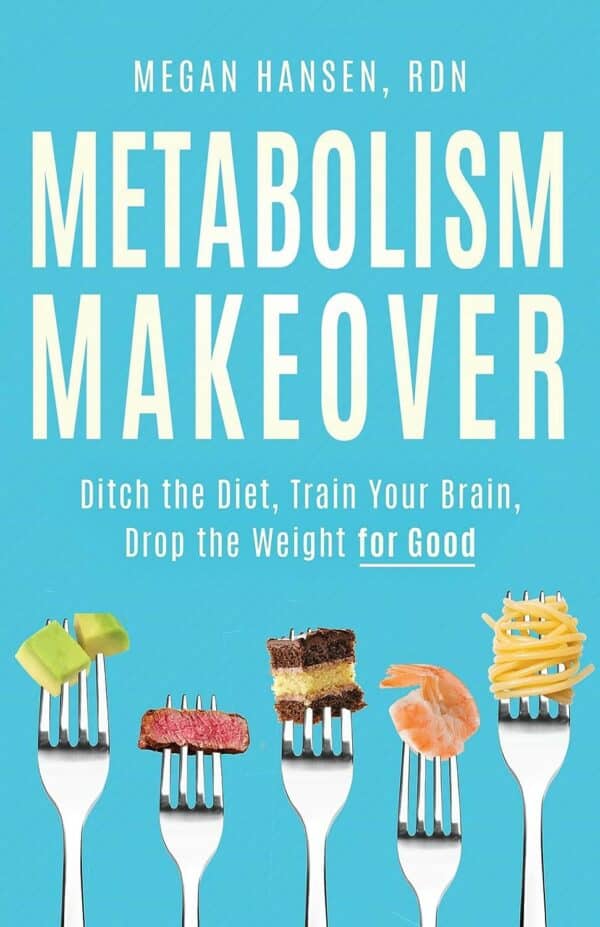Discover how to escape the cycle of fad diets and achieve sustainable weight loss through Megan Hansen’s Metabolism Makeover Program. If you’ve been stuck on a diet but not seeing results, this article can help you understand how to lose weight without giving up your favorite foods or completely changing your life.
Megan Hansen, a registered dietitian, advises on how to have a healthy relationship with food and maintain a balanced weight in the long term. Discover the secrets to control your metabolic ecosystem and understand why this book is not like other diet books.
Key Takeaways:
- The time to ditch the diet and learn to trust in more sustainable practices is now. Metabolism Makeover Program is a holistic approach focused on sustainable weight loss, arguing against the narrow focus of the diet industry that the key to success lies within restrictive practices.
- Training your brain is vital for developing healthy eating habits.
- Sustainable weight loss comes from understanding and working with your body, not from restricting it.
- The six key pillars of the metabolic ecosystem are crucial for long-term weight management.
- Good sleep and stress management are essential for regulating appetite and metabolism.
- Sugar control helps to manage cravings and support weight loss.
- Listening to your body’s hunger signals is key to controlling your appetite and is essential to regain control of your appetite effectively.
- Carbs are an important part of a balanced diet and should not be eliminated.
- Exercise and nutrition plans should be tailored to fit individual lifestyles for long-term adherence.
What Is the Metabolism Makeover Program by Megan Hansen?
The Metabolism Makeover Program is designed by dietitian Megan Hansen. It aids in lasting weight loss through a holistic method. This program is unique when compared to traditional diet books. Megan focuses on understanding the body’s functions rather than limiting food intake and counting calories. The secret to losing weight effectively lies in not just eating less. It’s about knowing how our bodies operate and choosing healthier options.
Understanding the Metabolic Ecosystem
The journey to a healthier you start with a deep understanding of how your metabolic ecosystem functions. Registered dietitian Megan has designed the Metabolism Makeover Program to guide you through the complex landscape of your body’s metabolism. Knowing how your lifestyle choices affect this system is key to achieving and maintaining optimal health.
The Science Behind Metabolism
Your metabolic rate is key to your well-being. It tells you how your body uses and stores energy. Diet and exercise are important, but the hidden complexities of our metabolism can greatly impact our weight. It’s not just about what you eat, but how your body processes it. That’s where sugar control and understanding your relationship with food come into the equation.
Your well-being depends largely on your metabolic rate. This rate shows how your body uses and stores energy. Diet and exercise are important, but there’s more to it. The complex workings of your metabolism can greatly affect whether you gain or lose weight. It’s not only about the food you eat. It’s also about how your body handles that food. Controlling sugar and knowing how you interact with food are key factors.
How Different Foods Affect Your Body
Your body is like a precision machine. What you eat can boost its function or make it struggle. Learn how carbs, proteins, and fats affect your energy in different ways. With the Metabolism Makeover Program, you’ll learn how to make smart choices when it comes to selecting your foods. This promotes a healthy metabolism, increases your metabolic rate, and regulates your blood sugar.
Exploring the Six Key Pillars of Metabolic Health

Blood Sugar Control: Critical for maintaining energy and preventing mood swings.
Quality Movement: Regular, consistent activity tailored to fit your lifestyle helps stoke the metabolic furnace.
Muscle Health: More muscle equals a higher resting metabolic rate, aiding in long-term weight management.
Restful Sleep:Good sleep is a linchpin for hormonal balance and a healthy metabolism.
Effective Stress Management: Chronic stress can throw your metabolic equilibrium into chaos, undermining your health efforts.
A Healthy Gut: An often-overlooked aspect of metabolism, Gut health is significantly influenced by our dietary choices, emphasizing that another diet is trusting ourselves enough to make beneficial changes. influences everything from mood to immune function.
Megan will guide you to understand how your everyday habits affect key aspects of your health. She’ll help you organize these habits to create a healthy metabolism. The Metabolism Makeover Program focuses on adjusting different areas of your life. This way, your path to health isn’t based on strict diets. Instead, it’s about sustainable habits that help you enjoy a positive, healthy connection with food and your body.
Turning the Tables: Ditch the Diet Mentality
Stop following strict diets and constantly counting calories. Let go of the myths about needing strong willpower. Eating well isn’t about self-denial. Instead, understand how your metabolism works. Empower yourself with this knowledge. Make choices that help you form lasting, healthy habits. This will give you more energy.
Why Is It Important to Train Your Brain for Weight Loss?
Training your brain is critical in achieving and maintaining weight loss. Megan Hansen strips away the complexity and confusion surrounding dieting and replaces them with a simple framework. The framework trains your brain to make better food choices, improving your eating habits and relationship with food.
How Can Ditching the Diet Lead to Sustainable Weight Loss?
Megan insists that ditching the diet mentality is essential for sustainable weight loss. The diet industry often claims that success lies in restricting food, causing us to count calories and cut out certain food groups, which can make us fear failure. Hansen encourages a shift in mindset from short-term diets to long-term health improvements.
The Myth of Willpower and Diet Industry Fallacies

Have you ever found yourself failing at another diet, steeped in guilt, and wondering where your willpower went? The reality, shared by Registered Dietitian Nutritionist Megan Hansen, is that the diet industry’s influence has overstated the role of willpower. Blaming oneself can overshadow the need to understand body functions and needs, creating a harmful cycle.
A Registered Dietitian’s Personal Journey Megan Hansen shares her experience with her own eating challenges to reveal a common struggle. She demonstrates that eating less and exercising more is not always the key to success. She teaches us to listen to and honor what our bodies tell us. By understanding our bodies better, we can improve our ability to burn fat without strict limitations.
Why Calorie Counting Fails: A Deeper Look
Calorie counting, yet we continue to count calories, showcasing the contradictory nature of the diet industry. seems like a straightforward approach to weight loss. However, it’s a method fraught with inaccuracies in how we learn how our bodies work. Megan Hansen highlights the complex interplay of hormones, genetics, and environmental factors that calorie counting Fails to consider the holistic view of diet that dietitian nutritionist Megan Hansen strips away, advocating for a more comprehensive understanding of metabolic health. metabolic health that supports long-term well-being rather than transient victories on the scale.
Fueling Your Metabolism Makeover
The meal plan includes a variety of metabolism-boosting foods. You’ll find leafy greens, lean proteins, and fruits rich in antioxidants. Meals are well-balanced and pleasing to the eye. Portions are generous enough to fill you up. They also have different textures and flavors to keep your meals exciting. The food is presented simply and stylishly highlighting the freshness and nature of the ingredients.
Eating the right foods is vital to speed up your metabolism and burn fat efficiently. It’s important to focus on eating well rather than eating less. Choose nutrients that fit your dietary needs. You should enjoy your meals and feel energized. Your meal plan should also support your daily activities and help you sleep well at night.
Your body is an expert in signaling its needs; hence, tuning into your relationship with food is pivotal. To boost your metabolism, eat foods like complex carbohydrates for energy, lean proteins for muscle repair, healthy fats for hormone synthesis, and a variety of fruits and vegetables for vitamins And minerals, which are often underappreciated in discussions dominated by the diet industry that the key to nutrition is not about restriction but about balance. Let’s explore some of the best foods for metabolism and how they can be incorporated into a daily meal plan that helps you stay full and energized.
Metabolism-Boosting Tips: Combining protein-rich foods with fibrous vegetables to keep you full and energized for longer periods.
Sugar Control: Integrating foods with low-glycemic indexes to avoid spikes in blood sugar levels, which can lead to energy crashes.
Good Sleep Hygiene: Avoiding heavy meals close to bedtime to prevent discomfort and promote restful sleep.
A balanced meal plan that boosts your metabolism
- For breakfast, have oats. Add almond milk, fresh berries, and chia seeds for fiber and antioxidants.
- Lose weight and maintain it by enjoying Greek yogurt as a morning snack, without being deceived by diet industry tricks. Include a handful of nuts and some honey for protein and healthy fats.
- Lunch is grilled chicken with quinoa, steamed broccoli, and avocado. It’s a meal with lean protein, complex carbs, and vitamins.
- Have apple slices with natural peanut butter and cinnamon for an afternoon snack. This combination provides fiber and healthy fats, which are important components recommended for a balanced diet.
- Dinner is sautéed salmon with roasted sweet potatoes and a mixed greens salad. This provides omega-3 fatty acids and micronutrients.
Remember, it’s not about strict rules. It’s a flexible diet that promotes a healthy relationship with food and nourishes your body, indicating it’s time to stop dieting and learn what really works.Doing this can boost your metabolism and also help you enjoy eating for health and pleasure.
Building Muscle for Sustainable Weight Loss
To boost your metabolism and achieve long-term weight loss, it’s crucial to know the significant impact of building muscle. Muscle isn’t just for athletes; it’s fundamental for anyone aiming to increase metabolism and reach their weight loss goals. Let’s break down why muscle mass is not a mere byproduct of fitness but the powerhouse behind a metabolic boost and optimal health, making it clear that diet is trusting ourselves enough to nourish properly and intelligently. Boosting your energy expenditure is key to losing weight and keeping it off, contrary to what the diet industry might preach..
The Role of Muscle Mass in Metabolism
When you focus on increasing muscle mass, you’re effectively setting up a calorie-burning workshop within your body. Muscles are like engines that constantly burn fat and sugar to sustain themselves— even when you’re at rest, making them critical for a healthy metabolism. Picture your muscles as workers that are always on the clock, ensuring your metabolic rate never hits a lull.
Fat vs. Muscle: The Energy Expenditure Difference
Understanding the fundamental difference between fat and muscle can be transformative. Fat cells are relatively idle, storing energy rather than expending it. Conversely, muscle cells are bustling hubs of activity, continuously using up calories and boosting your overall energy expenditure. This intrinsic difference is paramount in transforming your body’s resting metabolic state and sculpting a slimmer, more efficient you.
Effective Weight Training Strategies for Enhanced Metabolic Rate
Adding weight training to your fitness routine could be exactly what you need. It’s important to create a workout plan that fits into your daily life. This will help you get the most out of the metabolic benefits. Use a mix of free weights, machines, and bodyweight exercises to keep your workouts interesting. This way, your muscles will continue to adapt and grow. The goal isn’t just to burn calories now; it’s also about managing your weight in the long run. A healthy metabolism from weight training can benefit you for years to come.
Weight training makes your body better at burning fat, which helps with weight loss. It also boosts your energy and overall health. As you make these exercises a part of your routine, expect a transformation in your body shape. You’ll also see an improvement in your body’s metabolic processes.
Designing Movement into Your Lifestyle
A person walking briskly on a sunny day with rays of sunlight highlighting their movement. The person’s muscles are visibly toned, and their body is glowing with sweat from the workout. In the background, there is a cityscape with buildings and streets bustling with people also enjoying active lifestyles. The sky is clear and blue, indicating a healthy environment.
Adopting a healthy lifestyle isn’t just about your diet. It’s about adding movement to your everyday routine. The Metabolism Makeover helps you change the way you think about exercise. It encourages you to include exercises that increase your metabolism. These should fit into your own schedule and match what you like to do. The key idea is that every bit of movement matters. This makes weight loss achievable without strict diets.
Imagine enhancing your metabolism improvement efforts with simple yet effective steps. From taking daily walks to engaging in fun activities that elevate your heart rate, you have the power to make powerful changes. This isn’t about overhauling your life; it’s about smartly integrating essential movement where you can. Picture the compounded benefits of these actions over weeks, months, and years, leading to a more vibrant and energized you.
Movement into various aspects of your everyday life
Here’s a snapshot of how you can design movement into various aspects of your everyday life:
Work Arrangements: Opt for a standing desk or take brief walks during your breaks.
Leisure Time: Choose active hobbies like gardening, dancing, or hiking to fill your weekends.
Household Tasks: Convert chores into a workout—try doing lunges while vacuuming or squats during laundry.
Family Activities: Join your kids for a soccer game or a bike ride around the neighborhood, showing them that dietitian nutritionist Megan Hansen strips away the idea that you need a restrictive diet to stay healthy.
Remember, the aim is to move a seamless part of your lifestyle rather than an additional task on your to-do list. Boosting your metabolism not only benefits you but also leads to a more energetic and joyful life. Start small, stay consistent, and see how small changes can improve your well-being without harsh diets or intense workouts.
Restorative Sleep and Stress Management for a Balanced Metabolism
It’s important to have a balanced metabolism, especially when we consider the combined effects of good sleep and stress control. Megan Hansen points out that sleep and stress are closely connected to your health. If you don’t sleep well or manage stress effectively, you could face a series of negative effects on your metabolism. This could mean less energy due to lack of sleep or gaining weight because of stress-related habits. However, if you learn how to improve your sleep and reduce stress, you’ll have more energy every day. You’ll also make your metabolism stronger.
How Good Sleep Influences Metabolic Rates
When your nights are filled with good sleep, your body undergoes a restoration process that directly impacts your metabolic rate. Achieving a state of restful sleep consistently aids in managing stress hormones, repairing muscles, and regulating blood sugar levels—all of which are crucial for maintaining metabolic homeostasis. Sleep deprivation can act like a spanner in the works of your metabolism, making energy increase a challenge while also skewing hunger signals and insulin sensitivity.
Coping Mechanisms for Reducing Stress-Induced Weight Gain
Next to a restful night, stress management stands as a pillar of metabolic health. Chronic stress triggers hormonal fluctuations that can lead to increased appetite and fat storage—risk factors for weight gain. Integrating calming strategies into your life, such as deep breathing exercises, yoga, or even short, mindful breaks, can play a pivotal role in managing stress and keeping those stress-related cravings in check.
Tools for Improving Sleep Quality
The tools to improve your sleep quality are both accessible and effective. Make your bedroom cool, dark, and quiet to help you fall asleep faster and sleep longer. Stick to the same sleeping schedule and cut down on screen time before bed to improve your sleep.
Here’s a clear table of sleep and stress management strategies:
– Establish a Routine: Go to bed at the same time every day. Make time to relax daily.
– Optimize Environment: Make sure your bedroom is dark, quiet, and cool. Set up a relaxing personal space.
– Engage in Physical Activity: Exercise regularly, but not right before bed. Try yoga or stretching to ease stress.
– Mindful Eating: Don’t eat heavy meals or have caffeine before bed. Eat a balanced diet to keep your mood and energy steady.
– Digital Detox: Cut back on screens before sleep. Keep work communication within limits.
– Practice Mindfulness: Use meditation to get ready for sleep. Use meditation to stay focused and handle stress.
Following these steps will help you sleep better, manage stress, and feel good overall. These healthy habits can boost your energy, help control your weight, and lead to a balanced lifestyle.
Conclusion
We are at the end of our metabolism makeover journey. It’s important to think about the powerful tips from Megan Hansen. Losing weight is more than just losing pounds. You need to take care of your overall metabolic health. This guide has given you ways to control hunger and maintain your weight long-term. It reminds you to focus on your overall health, not just the number on the scale.
Revitalizing Your Metabolic Health: Key Takeaways
The secrets to sustainable health gains revolve around understanding and tuning into your body’s unique needs. Empowering your metabolism is unique to each person, showing that the key to successfully losing weight is eating less in a smarter way. To have a healthy metabolism that lasts a long time, you need to take care of all the things that affect it. This includes eating well, building muscle, managing stress, and getting enough sleep.
Adopting a Holistic Approach for Lasting Weight Management
Sustainable weight management comes from a holistic approach that combines healthy eating, physical activity, and the understanding that eating less and moving more are key to successful weight loss. This delicate equilibrium involves attuning to your body’s signals while steering it through knowledgeable decisions. Essential to a thriving lifestyle is the art of maintaining balance and heeding your body’s needs. You have the power to create a healthy lifestyle that brings you joy and energy. Choose what is best for your well-being, such as designing a balanced meal plan or finding energizing exercises.
Empowering Yourself Beyond the Scale
Remember that real change goes beyond the numbers on the scale. It’s about waking up feeling energized every day. It’s about enjoying life’s joys without being limited by food rules, gaining confidence through knowing how to balance your metabolism. Know that your health is not just about numbers or measurements. It’s rooted in the quality of your everyday life.
Metabolism Makeover

Ditch the Diet, Train Your Brain, Drop the Weight for Good
- Increase metabolism, not decrease calories
- Shift mindset around food rules
- Emphasize building healthy muscle
- Comprehensive approach to improving metabolism
- Empowerment for long-term results
FAQ
What is the Metabolism Makeover by Megan Hansen?
The Metabolism Makeover is a comprehensive program designed to help you achieve sustainable weight loss and a healthier metabolism. Developed by registered dietitian Megan Hansen, it focuses on a holistic approach To health, addressing the six key pillars of metabolic health, debunking diet myths taught by the diet industry, and providing actionable strategies to boost your metabolism.
Can the Metabolism Makeover actually increase my metabolism?
Yes, the program includes strategies to boost and improve your metabolic rate through various means such as optimizing your meal plan, incorporating muscle-building exercises, integrating regular movement into your life, managing stress, and ensuring good sleep quality.
Does the program involve calorie counting?
No, Megan Hansen emphasizes the importance of moving away from calorie counting and restrictive dieting. She promotes a better understanding of how the body works and the nutrients it needs for metabolism without the stress of counting calories.
How important is sleep for my metabolism according to the program?
Very important. The Metabolism Makeover highlights that restorative sleep is critical for a balanced metabolism. Adequate sleep boosts metabolism, controls hunger, and prevents weight gain caused by hormonal imbalances due to lack of sleep.
Is the Metabolism Makeover appropriate for those with specific dietary requirements?
Yes, the program provides flexible meal plans that can be tailored to accommodate different dietary needs and preferences. It focuses on the inclusion of a variety of nutrients to fuel metabolism and can be adjusted to suit individual nutritional requirements.
What is Megan Hansen’s perspective on traditional diets?
Megan Hansen critically evaluates the shortcomings of traditional diets, such as the overemphasis on willpower and simplified calorie counting that often lead to a yo-yo dieting cycle and don’t address the underlying factors of metabolism. Her approach teaches you to understand and work with your body’s natural mechanisms for a more effective and sustainable weight loss.
Does building muscle really affect my metabolism?
Yes, muscle tissue has a higher metabolic rate compared to fat tissue. Building muscle mass can increase your resting metabolic rate, which helps your body burn more calories even when you’re not active, aiding in sustainable weight loss and improved metabolic health.
What role does managing stress play in maintaining a healthy metabolism?
Chronic stress can disrupt hormones, affect appetite and metabolism, and lead to weight gain. Managing stress is important for The Metabolism Makeover. Implementing effective stress management techniques is essential for maintaining a balanced metabolic ecosystem.
Are there metabolism-boosting supplements recommended in the Metabolism Makeover?
The Metabolism Makeover focuses on using nutrition, exercise, and lifestyle changes to naturally boost metabolism. Megan Hansen talks about supplements, but the program focuses more on sustainable and holistic health practices instead of relying on supplements.
What makes the Metabolism Makeover different from other diet plans?
Other diet plans may focus on quick, restrictive solutions, yet we continue to count calories. But the Metabolism Makeover is different. It takes a detailed approach to understand your metabolism. It aims for lasting changes in your lifestyle. This plan helps you make smart choices by teaching you the science of metabolic health. It also shows you how to understand your body’s signals.
Source Links
https://ww2.metabolismmakeover.co/book
https://www.goodreads.com/book/show/61822460-metabolism-makeover
As a veteran fitness technology innovator and the founder of GearUpToFit.com, Alex Papaioannou stands at the intersection of health science and artificial intelligence. With over a decade of specialized experience in digital wellness solutions, he’s transforming how people approach their fitness journey through data-driven methodologies.
